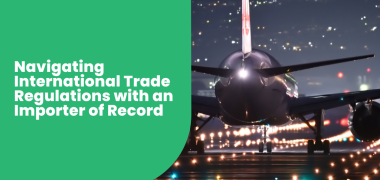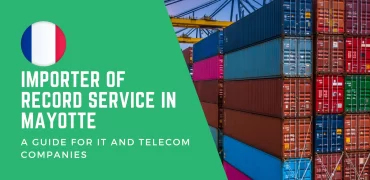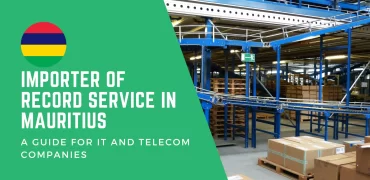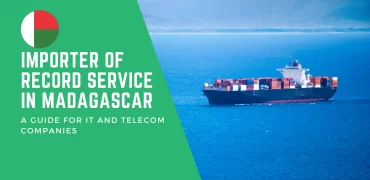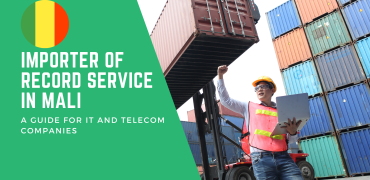International trade is a complex web of regulations, tariffs, and logistical challenges that businesses must navigate to successfully import and export goods. For companies looking to expand their markets globally, understanding and complying with international trade regulations is crucial. One essential element in this process is the role of an Importer of Record (IOR). This blog post aims to provide a comprehensive guide on how to navigate international trade regulations with the assistance of an IOR, highlighting key considerations, benefits, and best practices.
Understanding the Role of an Importer of Record (IOR)
What is an Importer of Record?
An Importer of Record (IOR) is an entity responsible for ensuring that imported goods comply with local laws and regulations of the destination country. This entity assumes legal liability for the importation process, including the payment of duties, tariffs, and taxes, as well as the proper documentation and clearance of the goods through customs. The IOR can be the importer itself, a customs broker, or a third-party service provider specializing in IOR services.
Why is an IOR Important?
The IOR plays a critical role in international trade by:
- Ensuring Compliance: The IOR ensures that all import activities comply with the legal and regulatory requirements of the destination country, reducing the risk of penalties and delays.
- Handling Documentation: The IOR manages the complex documentation process required for customs clearance, including invoices, packing lists, and certificates of origin.
- Assuming Liability: The IOR takes on the legal responsibility for the imported goods, providing a level of security and assurance for businesses.
- Facilitating Smooth Operations: By handling the import process efficiently, the IOR helps businesses avoid disruptions in their supply chain and ensures timely delivery of goods.
Key Considerations in Choosing an Importer of Record
Expertise and Experience
When selecting an IOR, it is crucial to consider their expertise and experience in handling the specific types of goods you intend to import. Different products may be subject to varying regulatory requirements, and an experienced IOR will be well-versed in navigating these complexities.
Geographic Coverage
Ensure that the IOR has a strong presence and knowledge of the regulatory environment in the countries where you plan to import goods. This geographic expertise is vital for smooth customs clearance and compliance.
Reputation and Reliability
Research the reputation and reliability of potential IORs by seeking references, reading reviews, and checking their track record with previous clients. A reliable IOR will have a history of successful import transactions and satisfied customers.
Range of Services
Evaluate the range of services offered by the IOR. Comprehensive IOR services should include customs brokerage, documentation management, regulatory compliance, and post-clearance support. Some IORs may also offer additional services such as warehousing, logistics, and supply chain management.
Navigating International Trade Regulations with an IOR
Understanding Regulatory Requirements
Different countries have distinct regulatory frameworks governing the importation of goods. These regulations can include product-specific requirements, safety standards, labeling and packaging mandates, and restrictions on certain types of goods. An IOR helps businesses understand and comply with these regulations, reducing the risk of non-compliance.
Harmonized System (HS) Codes
One of the key aspects of international trade regulations is the use of Harmonized System (HS) codes. HS codes are standardized numerical codes used to classify products for customs purposes. Accurate classification of goods using HS codes is essential for determining the applicable duties, taxes, and regulations. An experienced IOR will assist in correctly identifying and using HS codes for your products.
Import Licenses and Permits
Certain goods may require import licenses or permits before they can be legally imported into a country. The IOR ensures that all necessary licenses and permits are obtained and that the import process adheres to the relevant regulatory requirements. This step is critical for avoiding delays and legal issues at customs.
Tariffs and Duties
Tariffs and duties are financial charges imposed by governments on imported goods. These charges vary depending on the type of product, its country of origin, and trade agreements in place. The IOR calculates the applicable tariffs and duties, ensuring accurate payment and compliance with financial regulations.
Documentation and Record Keeping
Proper documentation is a cornerstone of successful international trade. The IOR manages the preparation and submission of all required documents, including commercial invoices, packing lists, bills of lading, and certificates of origin. Additionally, the IOR maintains meticulous records of all import transactions, which are essential for audits and future reference.
Customs Clearance Process
The customs clearance process involves a series of steps to ensure that imported goods meet all regulatory requirements and are allowed entry into the destination country. The IOR handles this process on behalf of the importer, which includes:
- Pre-Arrival Processing: Submitting necessary documentation to customs authorities before the goods arrive.
- Inspection and Examination: Coordinating with customs officials for the inspection and examination of goods, if required.
- Duty Payment: Calculating and paying any applicable duties, taxes, and fees.
- Release of Goods: Ensuring that goods are released from customs and delivered to the final destination.
Benefits of Using an Importer of Record
Compliance and Risk Mitigation
By leveraging the expertise of an IOR, businesses can significantly reduce the risk of non-compliance with international trade regulations. This compliance ensures smooth customs clearance, minimizes the likelihood of penalties and fines, and protects the company’s reputation.
Cost Efficiency
Although hiring an IOR involves a financial investment, it can ultimately result in cost savings. The IOR’s knowledge and experience help prevent costly delays, reduce the risk of errors in documentation, and ensure accurate calculation and payment of duties and taxes.
Time Savings
Navigating international trade regulations and customs processes can be time-consuming. An IOR streamlines these processes, allowing businesses to focus on their core operations and reducing the time spent on administrative tasks.
Expertise and Local Knowledge
IORs possess specialized knowledge of local regulations, customs procedures, and market conditions. This expertise enables businesses to navigate complex regulatory environments with confidence and efficiency.
Enhanced Supply Chain Management
With the support of an IOR, businesses can achieve more efficient and reliable supply chain management. Timely customs clearance and compliance with regulations ensure that goods reach their destination without unnecessary delays, enhancing overall supply chain performance.
Best Practices for Working with an Importer of Record
Clear Communication
Effective communication is essential when working with an IOR. Establish clear lines of communication and provide all necessary information about your products, shipping details, and regulatory requirements. Regular updates and transparent communication help ensure a smooth import process.
Due Diligence
Conduct thorough due diligence when selecting an IOR. Evaluate their expertise, track record, and range of services. Verify their credentials and ensure they have the necessary licenses and permits to operate in the countries where you plan to import goods.
Collaboration and Coordination
Collaborate closely with your IOR throughout the import process. Provide timely and accurate information, respond promptly to requests for documentation, and coordinate with them to address any issues that may arise during customs clearance.
Staying Informed
International trade regulations are subject to change, and staying informed about updates and new requirements is crucial. Work with your IOR to stay updated on regulatory changes that may impact your imports and adjust your processes accordingly.
Leveraging Technology
Many IORs utilize advanced technology and digital tools to streamline the import process. Take advantage of these technologies to enhance efficiency, track shipments, and manage documentation more effectively.
Conclusion
Navigating international trade regulations is a complex and challenging task that requires a deep understanding of local laws, customs procedures, and documentation requirements. An Importer of Record plays a pivotal role in ensuring compliance, mitigating risks, and facilitating smooth customs clearance. By choosing the right IOR and following best practices, businesses can successfully navigate the complexities of international trade and expand their global reach with confidence.
In summary, an Importer of Record is an invaluable partner for businesses engaged in international trade. Their expertise, local knowledge, and comprehensive services help businesses overcome regulatory hurdles, minimize risks, and achieve efficient and compliant import operations. By leveraging the support of an IOR, businesses can focus on their core activities while ensuring the seamless importation of goods into new markets.
